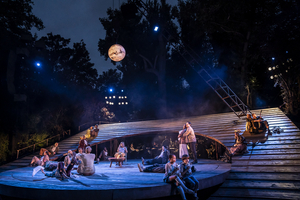Review: CAROUSEL, Regent's Park Open Air Theatre
Director Timothy Sheader and choreographer Drew McOnie succeed in turning the classic story of devotion heavily laced with abuse into a cautionary tale.

![]() During the first three weeks of the initial lockdown in 2020, 16 women and children were murdered in the United Kingdom because of domestic violence. Those numbers were only going to rise during the following year. It is said that men were able to gain power and rule the world because murder makes them less uncomfortable.
During the first three weeks of the initial lockdown in 2020, 16 women and children were murdered in the United Kingdom because of domestic violence. Those numbers were only going to rise during the following year. It is said that men were able to gain power and rule the world because murder makes them less uncomfortable.
Early 2021 saw the online resurfacing of the hashtag #NotAllMen, the general rebuttal used by average cis-gender males to distance themselves from abusers and such, only to become an internet meme. Lions are very cute, but we don't try to pet one in the wild because "not all lions" kill people.
Whether it's lockdown, daily grievances, or the unexpected turnout of a football match, women all around England (and the world) don't feel protected in their own home. So, yes, it might be "not all men", but it certainly is way too many men. And it's definitely all the men in Richard Rodgers and Oscar Hammerstein II's adaptation of Ferenc Molnár's 1909 play Liliom.
Director Timothy Sheader presents a Carousel for the 21st century. He tilts the lights, fiercely condemning the outdated gender politics and horrifying misogyny of Rodgers and Hammerstein's musical. Drew McOnie's choreography is the key to the commentary as well as the real star of the show.
Sheader and McOnie succeed in turning the classic story of devotion heavily laced with abuse into a cautionary tale. Where the musical has been considered somewhat controversial for how it portrays the attitudes towards domestic violence, Sheader doesn't leave any space for doubts or justifications, and the urgency of his denunciation is exceptionally evident in McOnie's emotionally eloquent work.
We follow Billy Bigelow and Julie Jordan's ill-fated relationship, as they go from strangers to being an unhappily married couple. While his quick temper and unemployment put a strain on their marriage, a shocking picture starts to appear against the idyll of their seaside town. Not even the sense of community that the women assure each other can erase the fact that the men are predators and their (potential or committed) partners are their prey.
They assert their dominance effortlessly - the level of acquaintance between them and their victims doesn't matter. Julie is immediately patronised by her employer when he sees her out and about with Billy at night, and fires her for refusing to be escorted home. Throughout, it's the women who save each other and condemn the actions of the male presences in their lives.
As the latter thrust their way across the space, the wives, mothers, and youths are there for each other unremittingly, stepping up even when the husbands and fathers refuse or cannot do so. They call out the brutality they see and question the reasonings that rationalise it. They install a network of protection and slowly become the chorus and silent judges of Billy's (and therefore the other's) actions.
When all the characters eventually come back together in a big circle at the end, echoing the start of the show, it's the women who turn around one by one to look at the audience, while the men keep being stuck looking inside.
Declan Bennett and Carly Bawden are sensational as the main couple. His curtness and easily-stirred temper runs like electricity through her Julie, as she creeps her way up to displaying her powerhouse skills. Bennett's handsome looks and velveteen voice promptly clash with his rough tendencies and blatant misogyny.
The ensemble and supporting cast is sublime, with the dancers truly doing the heavy lifting with the storytelling. Joanna Riding is a divine Nettie Fowler, delivering an arresting "You'll Never Walk Alone" that ends up bearing the weight of everything that's happened in the past year and a half.
Tom Scutt designs a wooden set that plays with geometrical shapes, but remains quite natural and neutral. Earthy tones dominate the scene along with Molly Einchcomb's costumes, with the final picture vaguely recalling Giuseppe Pellizza da Volpedo's painting The Fourth Estate in hues.
From the grand dance opening where McOnie sums up the themes and perils of what's to come - seeing the male dancers acting out abuse and their children replicating those actions sets a particular mood - to the contrasting still tableaux of the dialogues, this version of Carousel writes the rules relating to the portrayals of these subjects.
It's easy to blame it on "different times", but Sheader proves that it's possible to stage questionable yet beloved pieces of theatre showing the inexcusability of their politics. It's refreshing to see Sheader take an unequivocal, indisputable stance instead of sentimentalising or adulating a classic.
Carousel runs at Regent's Park Open Air Theatre until 25 September.
Photo credit: Johan Persson
Reader Reviews

Videos

